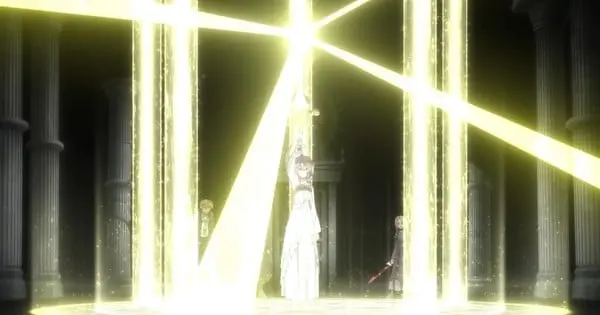The finale of “The Too-Perfect Saint: Tossed Aside by My Fiancé and Sold to Another Kingdom” has arrived, bringing Philia’s journey to a satisfying, albeit not flawless, conclusion. After being betrayed by her fiancé and homeland, Philia finds herself in Parnacorta, a kingdom in dire need of her saintly powers. As she navigates her new life, she confronts not only external threats but also her own internal struggles, ultimately discovering her worth and finding love and acceptance.
From Outcast to Savior
Philia Adenauer, the “too-perfect saint,” is anything but appreciated in her kingdom of Ziltonia. Despite her extraordinary abilities and tireless efforts to protect the realm, she is disliked by her parents, scorned by her fiancé Prince Julius, and envied by the populace. Her inability to express emotions and her perceived arrogance make her an easy target for criticism. Prince Julius, a power-hungry and selfish man, sees Philia’s competence as a threat and conspires with her parents to break their engagement. In a shocking turn of events, he sells her to the neighboring kingdom of Parnacorta, who recently lost their own Saint, for a hefty sum of resources.
Arriving in Parnacorta, Philia expects more of the same mistreatment. However, she is surprised to find herself welcomed with open arms. Prince Osvalt, the intelligent and compassionate ruler of Parnacorta, recognizes Philia’s value and seeks her guidance. As Philia uses her powers to protect Parnacorta from monsters and disease, she begins to open up emotionally and form genuine connections with those around her. She realizes that she doesn’t have to shoulder the burdens of an entire kingdom alone and that it’s okay to rely on others.
The Downfall of Ziltonia
Meanwhile, back in Ziltonia, Prince Julius’s actions have dire consequences. With Philia gone, the kingdom begins to crumble. The barriers protecting Ziltonia weaken, monsters run rampant, and the citizens realize just how much they relied on Philia’s abilities. Mia, Philia’s younger sister, recognizes the injustice of her sister’s banishment and vows to bring about Julius’s downfall.
Mia, though not as powerful as Philia, is a skilled Saint in her own right. However, she struggles to maintain the barriers and fight off the monsters while also dealing with the political turmoil caused by Julius’s incompetence. Seeing her kingdom on the brink of collapse, Mia decides to help Prince Julius’s ostracized brother gain power and expose Julius’s corruption.
Confronting Asmodeus
The climax of the series sees the emergence of a greater threat: the Archdemon Asmodeus, who has been manipulating events from behind the scenes. Asmodeus possesses Prince Julius and seeks to plunge the world into chaos. He kidnaps Philia and transports her to Limbo, where he reveals his plan to resurrect the Archsaint Fianna using Philia’s soul.
In Limbo, Philia confronts Asmodeus in his true form. Despite the demon’s immense power, Philia refuses to give up. She uses her holy magic to weaken Asmodeus, buying time for her friends to come to her rescue. Prince Osvalt, along with Erza, a skilled exorcist, and Mammon, a mysterious figure with his own agenda, arrive in Limbo to aid Philia.
A fierce battle ensues, with Philia and her allies fighting against Asmodeus and his demonic forces. The battle tests Philia’s strength and resolve, forcing her to confront her past traumas and embrace her true potential. Ultimately, Philia, with the help of her friends and a little assistance from her past self, defeats Asmodeus and saves both Ziltonia and Parnacorta from destruction.
A New Beginning
With Asmodeus defeated, peace is restored to the land. Philia returns to Parnacorta, where she is celebrated as a hero. She and Prince Osvalt finally confess their love for each other, solidifying their bond and promising a bright future for their kingdom.
In Ziltonia, Prince Julius is stripped of his power and faces the consequences of his actions. Mia works to rebuild the kingdom, forging a new path forward with the help of Julius’s brother. Philia and Mia reconcile, their sisterly bond stronger than ever.
The finale emphasizes themes of self-worth, acceptance, and the importance of human connection. Philia, once an outcast, finds a place where she is valued and loved for who she is. She learns to embrace her emotions and trust in others, finally finding happiness and fulfillment.
Mixed Reactions to the Finale
While many viewers found the finale satisfying, some felt that it had its shortcomings. Some criticisms included:
- Mia’s Ending: Some viewers felt that Mia’s ending was not as fleshed out as it could have been. Given her significant role in the story, particularly after Philia’s departure from Ziltonia, some wished to see a more solidified future for her, beyond just a renewed relationship with her prince. A flash-forward showing her impact on Ziltonia’s reformation could have provided a more complete sense of closure.
- The Damsel in Distress Trope: Some felt that reverting Philia, the “most powerful being” (besides the demon lords), into a damsel in distress for the sake of plot convenience was unnecessary. They argue that she could have still been instrumental in defeating Asmodeus without needing to be rescued, maintaining her agency and power throughout the climax.
- Forgiveness: The seemingly easy forgiveness of Philia’s mother, Hildegarde, after her past mistreatment, felt undeserved to some viewers. Although Hildegarde’s actions were partially influenced by external factors, the lack of a more thorough exploration of her redemption arc left some feeling that her forgiveness was rushed.
Despite these criticisms, many viewers praised the finale for its emotional payoff, the restoration of the mother-daughter bond (or its creation), and the opportunity for Philia and Mia to interact freely as peers. The establishment of strong romantic relationships for both sisters also contributed to the finale’s satisfying conclusion.
Final Thoughts
“The Too-Perfect Saint: Tossed Aside by My Fiancé and Sold to Another Kingdom” delivers a heartwarming and ultimately satisfying conclusion to Philia’s journey. While some plot points and character arcs could have been more fleshed out, the finale successfully emphasizes the importance of self-worth, acceptance, and genuine human connection. Philia’s transformation from an emotionally stunted outcast to a confident and loved leader is a testament to the power of finding one’s place and embracing one’s true self. Despite some minor flaws, the finale provides a sense of closure and leaves viewers with a feeling of hope for the future.









